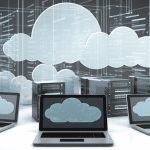New threats and regulations lead companies to update security strategies

A new report from LogRhythm, based on a survey from Dimensional Research, reveals that 95 percent of enterprises have changed their cybersecurity strategies in the last 12 months.
Drivers of this change include keeping pace with the shifting regulatory landscape (98 percent), the need to meet customer expectations for data protection and privacy (89 percent) and the rise of AI-driven threats and solutions (65 percent).
New tool lets enterprises build their own secure gen AI chatbots

Many companies have blocked access to public LLMs like ChatGPT due to security and compliance risks, preventing employees from taking advantage of the benefits of generative AI for day-to-day use.
Even when employees do have access, mainstream LLMs lack the ability to query an organization’s internal data, making insights unreliable and considerably limiting enterprise value for chat applications.
Ransomware rampage -- how to fight back against attacks [Q&A]

Amid a tumultuous 2023 marked by economic anxieties and rising geopolitical tensions, threat actors seized the opportunity to weaponize fear and uncertainty. While ransomware trends had previously ebbed and flowed, experiencing a 23 percent decrease in just the first half of 2022, they took a shocking turn in 2023, skyrocketing by a staggering 95 percent.
We spoke with Andrew Costis, chapter leader of the Adversary Research Team at AttackIQ, to discuss why ransomware has taken headlines by storm and how the industry can empower security teams with the tools to fight back.
The dynamics of modern Windows device management [Q&A]

Despite Apple and Linux gaining ground in recent years Windows still commands over 50 percent of the endpoint desktop market.
This means that Windows device management is a key priority for enterprises. We spoke to Apu Pavithran, founder and CEO of Hexnode, to learn more about device management and how it can be used effectively.
Cybercriminals take aim at ERP apps

Many enterprises rely on some sort of ERP application for their business operations and decision making. The vast majority of large organizations use ERP applications from leading vendors like SAP and Oracle.
New research from threat data and intelligence leader Flashpoint and ERP cybersecurity and compliance leader Onapsis reveals evidence that SAP business-critical applications are increasingly in the sights of and valuable for cybercriminals.
People prefer support from humans over AI when implementing CRM

A survey from CRM solution provider Workbooks finds participants voicing their strong preference for human support over AI-powered solutions.
This not entirely surprising result shows that while AI-powered support may offer efficiency and cost-effectiveness, it falls short of meeting the nuanced needs of businesses seeking personalized assistance.
Enterprises not getting full value from their data

According to a new report, 73 percent of IT leaders are still struggling to transform data into delivering significant business value.
The survey of 150 UK IT leaders by cloud consultancy Appsbroker & CTS finds 91 percent have a specific mandate from their board or executive team to make their organization more data-driven and data-centric.
Cloud computing -- The first step to an effective data modernization strategy

Many organizations realize the benefits that lie within the data they collect daily. This modern approach to data empowers businesses to leverage data for innovation and monetization while at the same time enhancing security and privacy. While this may seem like a conundrum as companies have traditionally buried their data deep into IT architecture to prevent it from being accessible, even by the employees, today it is possible to have the best of both. This process starts with the cloud.
The healthcare sector is witnessing a swift surge in cloud adoption. By 2028, it is expected to grow at a Compound Annual Growth Rate (CAGR) of 18.74 percent. This trend of rapid adoption can be seen in the financial services sector too, where organizations are moving to the cloud at an accelerated pace.
Large businesses struggle to tackle cyber threats

Large businesses are finding it significantly more difficult to manage their cybersecurity than their smaller counterparts, according to new research from passwordless authentication company IDEE.
Based on a survey of more than 500 IT and cybersecurity professionals within UK businesses, the data reveals that 74 percent of respondents from large businesses (more than 500 employees) believe it has become far more challenging to defend against cyber attacks since the Covid-induced rise of remote and hybrid working.
Why you should worry more about SaaS than generative AI [Q&A]

There's a lot of talk at the moment about how the use of AI opens up businesses to additional risk. But is AI itself the issue or is it the way in which it's integrated with other applications?
We talked to Ran Senderovitz, chief operating officer of Wing Security, to discuss how enterprises need to re-prioritize their security to address the real attack surface, the SaaS apps that leverage AI.
Innovation and security: The challenges of Generative AI for enterprises

Despite what some might think, no, bots probably won't come looking for your job, but they may well attack your intellectual property. Generative AI (GenAI) has become a transformative technology for businesses in more ways than one.
In 2024, its widespread adoption will undoubtedly have an impact on organizations across all industries, resulting in increased productivity and efficiency. However, GenAI can be a double-edged sword. Organizations need to tread carefully when assessing organization security risk, especially when it comes to data protection.
Is your zero trust program at risk of failure? [Q&A]

Zero trust is no longer a 'nice to have' for cybersecurity leaders. As organizations embrace hybrid and remote workforces, the volume of cyberattacks and data breaches involving unauthorized access to networks, applications and systems has surged.
In response, cybersecurity leaders are striving to adopt a zero trust approach to security to reduce the risk of data breaches, ransomware and insider threats. However, the success of these efforts are being undermined by a variety of factors.
Windows 10 updates have broken Microsoft Connected Cache for some users

Microsoft has acknowledged that update released for Windows 10 this year may have resulted in unwanted side effects for some users. Specifically, enterprise users may have found that update released in 2024 have results in an inability to use Microsoft Connected Cache.
This affects how updates for Windows are delivered across networks and means that sysadmin may well have noticed spikes in download traffic as a result. For now, Microsoft has a workaround that those affected can try.
Get 'Kubernetes Secrets Handbook' (worth $35.99) for FREE

Securing Secrets in containerized apps poses a significant challenge for Kubernetes IT professionals.
Kubernetes Secrets Handbook tackles the critical task of safeguarding sensitive data, addressing the limitations of Kubernetes encryption, and establishing a robust Secrets management system for heightened security for Kubernetes. Starting with the fundamental Kubernetes architecture principles and how they apply to the design of Secrets management, this book delves into advanced Kubernetes concepts such as hands-on security, compliance, risk mitigation, disaster recovery, and backup strategies.
Industry turns to zero trust

A new study of industrial enterprises shows 72 percent have started adopting zero trust principles, with 38 percent of organizations establishing, implementing, and optimizing zero trust control measures.
The study from Xage and Takepoint Research surveyed over 250 cybersecurity senior leaders across critical infrastructure organizations, energy, utilities, transportation, oil and gas and manufacturing to gauge the current state of zero trust implementation.
Recent Headlines
Most Commented Stories
BetaNews, your source for breaking tech news, reviews, and in-depth reporting since 1998.
© 1998-2025 BetaNews, Inc. All Rights Reserved. About Us - Privacy Policy - Cookie Policy - Sitemap.